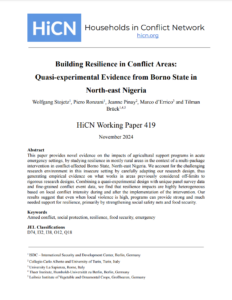This paper provides novel evidence on the impacts of agricultural support programs in acute emergency settings, by studying resilience in mostly rural areas in the context of a multi-package intervention in conflict-affected Borno State, North-east Nigeria. We account for the challenging research environment in this insecure setting by carefully adapting our research design, thus generating empirical evidence on what works in areas previously considered off-limits to rigorous research designs. Combining a quasi-experimental design with unique panel survey data and fine-grained conflict event data, we find that resilience impacts are highly heterogeneous based on local conflict intensity during and after the implementation of the intervention. Our results suggest that even when local violence is high, programs can provide strong and much needed support for resilience, primarily by strengthening social safety nets and food security.
Publication Details
- Year of Publication: 2024
- Region/s: Sub-Saharan Africa
- Theme/s: Human Development
- Research Topic/s: Agriculture · Conflict Measurement · Disasters & Emergencies · Violence & Conflict
- Method/s: Panel Data Analysis · Quasi-Experimental Designs
- DOI: https://hicn.org/working-paper/419/






